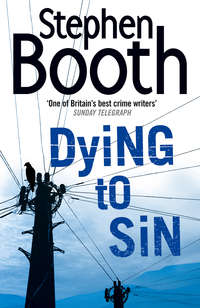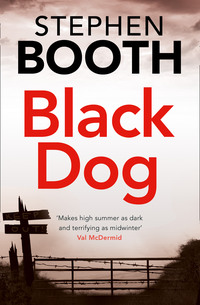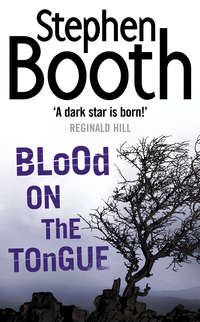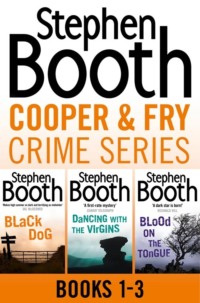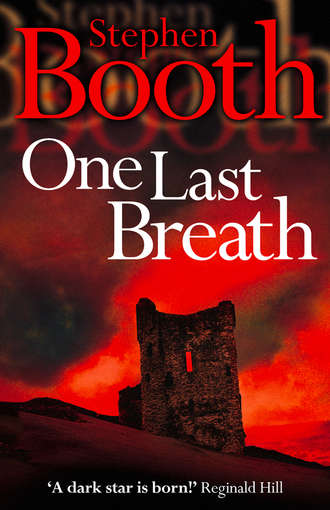
Полная версия
One Last Breath
Fry felt a surge of irritation and fought to contain it. ‘Who,’ she said, ‘is Mansell Quinn?’
The DI spun a little on his chair, glanced at Fry as if checking who she was. She had a feeling that he’d have said the same thing no matter who had walked into his office. He might have been having this conversation with the cleaner.
‘You won’t remember him, DS Fry,’ he said. ‘Quinn got a life sentence for murder some years ago. He lived in Castleton, a few miles up the road from here, in the Hope Valley. Do you know it?’
‘A tourist honeypot, isn’t it?’
‘Interesting place, actually. I went there as a kid. I remember being particularly impressed by the sheep – they came right down into the centre of the town. I suppose they must have been looking for food. I hadn’t seen one up close before.’
‘Sir?’ said Fry. ‘You were talking about somebody called Quinn …’
‘Yes, Mansell Quinn.’ Hitchens swung his chair back again and gazed out of the window. His eyes seemed to go out of focus, as if he were staring beyond Edendale to the country further north – towards Hope Valley, on the fringes of the Dark Peak. ‘Well, Castleton’s quiet most of the year, when the tourists aren’t there. People know each other very well. Quinn’s case caused quite a stir. It was a pretty violent killing – blood on the sitting-room carpet, and all that.’
Fry hadn’t been asked to sit down, so she leaned against the wall by the door instead.
‘A domestic?’
‘Well, sort of,’ said Hitchens. ‘The thing was, Quinn denied the charge at first, but entered a guilty plea at trial. Then he changed his mind again when he’d been inside for a while. He said he didn’t do it after all.’
‘A bit perverse. Did he get parole?’
‘No.’
‘He ruined his own case, then. The parole board would have thought he was in denial.’
‘It doesn’t work like that any more. Early release depends on an assessment of any future risk you might pose, not on whether you’ve accepted the court’s verdict. The Home Office makes an issue of it in its policy for lifers these days.’
‘They were forced into that, weren’t they?’
‘That’s a sore point around here, Fry.’
‘Sorry.’
‘Risk assessment,’ said Hitchens. ‘That’s what it comes down to. We know about risk assessment, don’t we?’
Fry nodded. Too often, it meant covering your back, a means of avoiding litigation or compensation payouts. But that was one thought she didn’t articulate. It might not have been what the DI meant.
‘Mansell Quinn had behaviour issues,’ said Hitchens. ‘He had to undertake anger-management training in prison.’
‘And he still didn’t get parole?’
‘No. Quinn served thirteen years and four months, until he reached his automatic release date.’ Hitchens turned round fully in his chair and leaned forward on his desk. ‘And that date is today. Mansell Quinn was due to collect his belongings and walk out of HMP Sudbury at half past eight this morning.’ Hitchens looked at his watch. ‘Half an hour ago, in fact.’
‘So?’
‘Quinn will be on licence. He’s supposed to move into temporary hostel accommodation in Burton on Trent, and he has an appointment with his probation officer this afternoon. One of the conditions of his licence is that he stays away from this area. We’ve been asked to keep an eye out for him, in case he breaches his conditions.’
Fry shrugged. ‘So what if he does turn up here? Sometimes prisoners get a bit over-excited about being out and decide to celebrate. We might find him in a pub somewhere, but it will mean nothing.’
‘Probably.’
She straightened up to leave the DI’s office. But then Fry hesitated, feeling there might be something more that he hadn’t told her.
‘Anger management? So Quinn is a violent man, would you say, sir?’
‘No doubt about it,’ said Hitchens. ‘He has a long history of violent incidents in his past. In fact, he got knockback early in his sentence because he assaulted a fellow prisoner. He broke the man’s arm and removed a couple of his teeth. And he couldn’t explain why he did it. Or wouldn’t.’
‘And what about the original murder?’
‘Well, there was certainly enough blood at the scene. The place was like an abattoir. Not what you’d want your sitting room to look like – especially in your nice new three-bedroom detached house in Castleton. Pindale Road, that was the place.’
Fry settled back against the wall with a sigh. ‘What happened exactly?’
‘Well, it seems that Quinn had made his way home from the pub, where he’d been drinking with his mates all afternoon. There was a row; he lost his temper, grabbed a handy kitchen knife … And bingo – a body on the floor, blood on the shag-pile, and the suspect still on the premises when a patrol responds to the 999 call. Terrible scenes with the kids arriving home. The whole street hanging out of their doors to see what was going on and generally getting in the way. All the usual mess. The victim was dead at the scene. She had multiple stab wounds to her body.’
‘An ordinary domestic, then,’ said Fry, irrationally disappointed. ‘One like thousands of others. I suppose the reasons for the argument might vary a bit, but the choice of household object doesn’t usually show much imagination. And it’s always the wife who ends up dead on the floor.’
‘Except there was one big difference in the Quinn case.’
Fry lifted her head.
‘What?’
‘The body on Quinn’s sitting-room floor,’ said Hitchens. ‘It wasn’t his wife’s.’
2
Sudbury Prison, Derbyshire
There used to be poppies in every cornfield once – they were bright red, like splashes of fresh blood. Mansell Quinn was sure he’d seen them all through the summer. As soon as the sun came out, they were everywhere in little clusters, peering from among the yellow stalks, nodding their bloodied heads in the sun, waiting for the combine to scythe them down. For a few hot days each year, a field in the bottom of the valley would be filled with entire red rivers of poppies, pooling and streaming, moving slowly in the breeze.
This morning, he noticed for the first time that there was a cornfield right across the road, its acres of brown stalks just starting to seed. The fences around it were strung barbed wire. Quinn looked for poppies in the corn, needing that glimpse of red. But there were no poppies.
As he walked towards the outer gate clutching a plastic carrier bag and his travel warrant, Quinn began to realize that even his liberty clothing was too big for him, and too stiff to be comfortable. He’d lost weight during the last fourteen years, and his body had hardened, as if a callus had grown over his skin, the way it had grown over his heart.
Past the gatehouse, he turned to look back for the last time. Above a bank of flowers was the white sign with its slogan Custody with Care and a mission statement: committed to rehabilitation and resettlement of prisoners.
Eight thirty was time for the morning collection. Right now, a court van was turning in through the gate and slowing for the speed hump, its steel grilles and reinforced doors making it look like an armoured personnel carrier. As Quinn stepped on to the grass to let it pass, the driver gave him a cautious glance, though the van would be empty yet this morning, its cage still smelling of too much disinfectant.
‘I’ll be home in an hour or so. And I can’t bloody wait. What about you?’
The man who fell into step alongside him was at least twenty years younger than Quinn, somewhere in his mid-twenties. He had short, gelled hair and a tattoo on the side of his neck, and he looked freshly shaved and scrubbed. He could have mingled with any bunch of lads in town on a Saturday night – which was just what he’d be doing by tonight, no doubt.
‘It’ll take me a bit longer than that,’ said Quinn.
‘Eh?’
‘A bit longer to get home.’
‘Oh? You sound like a Derbyshire bloke, though.’
‘That’s exactly what I am.’
‘Right.’
But Quinn had been born in the Welsh borders. It was there that the poppies had filled his summers. He supposed they must have found their way into the seed that the farmers sowed, or lay hidden in the ground until disturbed by the plough. Then they would flower before the wheat ripened, flourishing secretly between sowing and harvest. For the young Mansell Quinn, those poppies had been like a glimpse of wicked things existing where they shouldn’t be.
But when his father had got himself a new job as a forester on a country estate near Hathersage, his family had moved north to the Hope Valley. There were no cornfields among the gritstone hills and shale valleys of the Dark Peak.
The young man laughed. ‘You mean you’re getting right away from the old place? I don’t blame you, mate. Not for a minute.’
Quinn had no idea who the lad was. Yet in a way, they were as close as brothers. There were things that created a bond, ties that didn’t need to be talked about in these few minutes between the prison gate and the outside world.
‘Have you got somebody waiting at home for you?’ said Quinn.
‘Bloody right. I told her we’d get married when I came out. It’s only right, for the sake of the kids. We’ve got a council house and everything.’
‘Lucky.’
‘Yeah. I won’t be going back, that’s for sure.’
Quinn had stopped listening. His mind was on another house and another family.
‘Sometimes,’ he said, ‘you have to go back.’
‘You what? What are you saying? You know nothing about me, mate.’
‘No,’ said Quinn. ‘Nothing.’
The young man’s edginess subsided. It was only tension born of a fear of the unknown.
‘I’m Rick. You?’
‘Quinn.’
‘I’ve seen you around, I think. But I’ve not spoken to you before.’
‘Make the most of it.’
They walked across the road from the gate. This road was a dead end, created to serve the prison when the Sudbury bypass had been built. Ahead of them was the entrance to a concrete underpass.
‘So where are you heading?’ said Rick.
‘Burton on Trent. Some hostel my probation officer fixed up.’
The underpass was damp and smelly, a dim tunnel leading towards a patch of light. Their voices echoed from the walls, but the sound of their footsteps was muffled by the dirt floor.
‘First thing tomorrow,’ said Rick, ‘I’ll be off to Meadowhall to get myself a load of new gear. Well, after I’ve slept off the hangover from tonight, anyway. Getting pissed is the first priority.’ He laughed. ‘You too, I bet.’
‘Me too what?’
‘You’ll be getting some new clothes.’
Quinn looked down at what he was wearing. One of the first things he should do was find one of those charity shops where they sold secondhand stuff for a couple of pounds – the places he’d seen on his escorted absences: Oxfam, Cancer Research, Help the Aged. In one of those shops, he could pick up some jeans and a couple of shirts, maybe an old jacket that smelled of fag smoke, and a pair of boots. Dead men’s clothes probably, but who cared? They’d make him less noticeable. He had his discharge grant in his pocket, but there were other things he might need money for. Dead men could provide his clothes for now. It would be appropriate, in a way.
‘I’ve even got a job lined up,’ said Rick. ‘What a stroke of luck, eh? My probation officer helped me. He’s a decent enough bloke. A bit of money in your pocket, that makes all the difference, doesn’t it? A home to go to and your family around you. I’m going to get my life sorted out, just you watch.’
‘Good for you.’
‘I mean, I’m only twenty-five – I’ve got my whole future ahead of me. Besides, you can’t waste your life away when you’re a dad. I want my two to be proud of me some day. I don’t want them to think they’ve got a dad who’s a waster because he’s spent most of his life in the nick, do I?’
‘No.’
‘Have you got kids yourself, then?’
Mansell Quinn grimaced, and his jaw tightened. He said nothing. But the young man hadn’t really been interested in an answer.
‘I want them to do better for themselves than I’ve done,’ said Rick. ‘I want them to work hard and get on in the world. So I’m going to set them an example from now on. I promised Sharon I would. My lad wants to be a doctor, and I’m going to help him do that.’
The A50 was dusty, and the passing traffic stank of petrol and hot metal. Quinn had inhaled more fumes in the past five minutes than in the last fourteen years. He wished there had been poppies in the field. They would have been a good omen – blood in the fields matching the blood in his mind. But their absence made him uneasy. For the first time it occurred to him that life in the outside world might have changed in too many ways while he’d been gone.
These days, he supposed farmers treated their seed with chemicals to kill the poppies, to make every crop they planted perfectly pure and golden, totally sterile and dull. There was no more scarlet among the yellow, no more blood in the cornfields. Now, the blood moved only in his memory.
Rick looked at Quinn, leaving his own fantasy world for a moment.
‘Have you been inside for a while, like?’
‘Thirteen years and four months.’
‘Thirteen years? That’s tough.’
Quinn could see him working it out. You learned to do that in prison – to calculate parole and automatic release dates, all the stuff that the system hid with acronyms, as if they were no more than letters on the page of a report, rather than the days of a man’s freedom. Rick could work it out for himself. Thirteen years and four months meant his sentence must have been at least twenty years, even without parole.
‘A lifer, then?’
They had emerged from the underpass, back into the light. Quinn turned slowly, trying to orientate himself. The busy stretch of trunk road above him was new, and he didn’t know which direction anything was from the underpass. It was almost as if the prison existed in a strange little universe of its own, created to keep it away from the rest of the world.
‘Yes, a lifer.’
He knew that Rick wanted to ask the next question, but something was stopping him – maybe he was distracted by the slight stirring of the air between them, a draught blowing up from the underpass, causing a swirl of dust at their feet. Rick opened his mouth to speak, but a look of doubt clouded his eyes and he didn’t ask.
‘Who did you kill?’ he wanted to say. But he didn’t.
And that was a good thing. Because Mansell Quinn might not have been able to tell him.
There must be a way for the buses to come down off the A50, because there was a stop right here near the underpass and another across the road. In fact, there was a bus coming now, on his side of the road, heading for Burton upon Trent.
‘Here we go, then. Here we go.’
Rick took a firmer grip on his carrier bag. He spat into the gutter and watched his saliva seep into the dust.
‘Good luck, mate,’ said Quinn.
His companion looked at him oddly, but his attention was diverted by the approach of the bus. As soon as it pulled up to the stop and the doors folded open, he jumped on board.
Suddenly, Quinn took a step back from the bus stop. He gave the driver a blank stare as the man met his eye expectantly. Rick turned to watch him, not understanding what was happening, perhaps even a bit hurt. Then the doors closed, and the driver accelerated away from the stop.
Quinn watched the bus until it was out of sight. Despite the noise of traffic, all the cars were passing above him, on the main road. He looked for a moment at the exit from the concrete underpass, at the barbed-wire fences and the pale, bland acres of corn. Then he crouched, picked up a lump of stone that had fallen from the banking, and hurled it at the bus shelter. A glass panel shattered and crazed, its broken fragments showering on to the tarmac like crushed ice.
For a moment, Quinn smiled at the noise that exploded into the silence. And then he began to walk. Behind him, four words still seemed to echo amid the sound of shattering glass: Who did you kill?
3
Rebecca Lowe’s new house in Aston had been built to be almost airtight. The insulation created a difference in the internal air pressure from the outside world, so that the back door opened with a soft little cough as it parted from its draught-proof lining. The air was sticky outside, and the thunder flies were swarming. The tiny black insects covered everything when she wasn’t looking, and even the thought of them made her skin prickle, so that she constantly wanted to wash her face.
Inside the house, she had air conditioning. It had been one of the things Rebecca had insisted on after the discomfort of the previous summer and its record high temperatures. She couldn’t bear the humidity, which made her head ache, her temples throb and her hands slippery with perspiration. She’d slept badly for weeks, and changed her bedclothes every morning. The rumble of the washing machine had become a permanent background accompaniment to the long summer days.
In the new house, she could be cool. Parson’s Croft had been built of breeze-block on the inside, but with local gritstone on the outside, so that it blended in with the older houses and the landscape, as well as meeting the national park planning regulations. The site had a belt of mature sycamores and chestnut trees to screen the house and provide shade when the sun was in the west. But the air conditioning only worked properly if she kept all the doors and windows closed. Sometimes, the atmosphere in the house tasted stale, as if she were breathing the same air over and over again. It created its own kind of oppressiveness, a feeling that was almost as bad as the humidity outside.
Her dog Milly felt it, too. She lay in her basket all day, dozing restlessly, until it was time for her evening walk. And even when she got outside, she was bad tempered. She would yap at strangers, or worry obsessively at a stick or a piece of stone lying on the grass verge.
Today, Rebecca felt she would even welcome rain to bring a bit of freshness. As she finished washing up and wiped her hands, she walked into the lounge to look out through the double-glazed picture window. She examined the view down into the Hope Valley and up the slopes of Bradwell Moor and Abney Moor, her gaze skirting quickly past the tall chimney of the cement works in Pindale. Grey clouds were gathering over the moors, with darker patches among them, like blue bruises in the sky. There might be a shower later, with a bit of luck.
The phone rang in the still air. Rebecca put her towel down on the window ledge before she answered it, immediately identifying a familiar voice.
‘Mum, you know what day it is today?’
‘Monday,’ said Rebecca. ‘There, you see – I’m not entirely ga-ga yet. Try me with another one.’
She heard her daughter sigh at the other end of the line. She could picture Andrea sitting in a coffee bar somewhere, or striding along a London street with her mobile phone clamped to her ear. Living independently in the city and being good at her job as a buyer for a big retail chain had turned her into a formidable young woman.
‘Today’s the day he’s coming out, Mum,’ she said.
‘Yes, they told me.’
‘Aren’t you worried?’
‘No.’
‘You’re not? But, Mum, what if he comes out there?’
Rebecca was still looking out of the lounge window. She could see nothing but the flowering cherry tree and buddleias at the bottom of her garden, and a pair of mature lime trees. Red-and-black butterflies fluttered around the buddleias, bright and gaudy in the sun. A flycatcher dipped from his perch on the telephone wire, caught a mouthful of food on the wing, and landed back on the wire in one graceful movement.
‘I don’t think he’ll come here,’ she said.
‘A change of name isn’t going to fool him, you know.’
‘Of course not, Andrea.’
‘So what will you do, Mum? What precautions are you taking?’
‘Well, I haven’t fed Milly for days,’ said Rebecca lightly.
‘Mum, a geriatric Shih Tzu isn’t going to do much to protect you from an intruder, no matter how hungry she is.’
‘I was joking, dear.’
Rebecca moved a little to the right and lifted the curtain aside. Beyond the lime trees, she could see part of the field that backed on to the garden of Parson’s Croft. The field sloped away towards a stone barn where the farmer kept hay as winter fodder for his sheep.
‘This is nothing to joke about, Mum. You’re remembering to set the burglar alarms, aren’t you?’
‘Oh yes,’ said Rebecca.
‘Mum, if you’re not taking any precautions, I’m going to have to come up there and make sure you do.’
‘No. I don’t want you to.’ But then Rebecca heard her daughter’s intake of breath, and realized she might have sounded rude and ungrateful. ‘Not that I wouldn’t be pleased to see you. I always am, dear, any time. But I’m all right. Really.’
‘What about Simon? He’ll come and stay with you for a while. You know he will.’
‘Yes, he offered, but I told him not to. He’s not very far away, and I can always phone him. But I don’t want you or your brother to think you have to drop what you’re doing. You’re both much too busy.’
She heard her daughter sigh. ‘But, Mum –’
‘Look, I’m sure he won’t come here.’
‘Mum, remember what happened. You do remember what happened?’
‘Of course, dear. I was involved at the time. You weren’t.’
‘Not involved? I was twelve years old. You may not have been paying much attention to me, but I knew exctly what was going on.’
‘Not exactly,’ said Rebecca. ‘I don’t think you can have known exactly what was going on, can you?’
‘Well, OK. Just don’t tell me I wasn’t involved, Mum.’
Rebecca leaned to the left and let her forehead touch the glass of the window. This way, she could just make out the gable end of her neighbours’ roof. It was another new house, but much bigger than hers, with a fishpond, stone terraces, and a vast billiard-table lawn with sprinklers that ran eighteen hours a day in the hot weather. She rarely spoke to them, but they would occasionally smile and wave if they passed her in their Jaguar as she walked Milly on the lane.
‘I’m sorry, Andrea,’ she said. ‘You’re right. It must have been very traumatic for you.’
Her daughter went away from her phone for a couple of seconds. Rebecca could hear background chatter, and wondered if Andrea was mouthing a commentary at somebody sitting with her, wherever she was, exclaiming in exasperation at the impossible eccentricity of her mother back home in Derbyshire.
‘Well, anyway,’ said Andrea when she came back to the phone, ‘what on earth could you have to talk to him about now, Mum?’
‘There are things,’ said Rebecca, ‘that you might say were still unresolved.’
‘Oh God, Mum. I despair of you.’
Rebecca smiled. Her daughter really didn’t know everything.
‘But, in any case,’ Rebecca said, ‘he won’t come here.’
With an effort, Raymond Proctor smiled and nodded, forcing himself to be pleasant despite the anxiety in his stomach. These people were customers, after all. And customers were too few these days at Wingate Lees. They were a family from Hertfordshire – mum, dad and two kids. Their car stood near the roadway in front of one of the static caravans, ready to go.
‘Where are you off to today, then? Somewhere nice? The weather should be all right for you, I reckon.’
The woman stopped for a moment, ushering her children ahead of her to the car. ‘The kids want to go to one of the caverns,’ she said. ‘We thought we’d visit the one you suggested to us yesterday, Peak Cavern.’
‘Ah. The Devil’s Arse,’ said Proctor, grinning.
‘Pardon?’
‘That’s what they call it these days. I suppose they thought it would be more marketable.’ Then Proctor saw she wasn’t smiling. ‘Sorry.’


